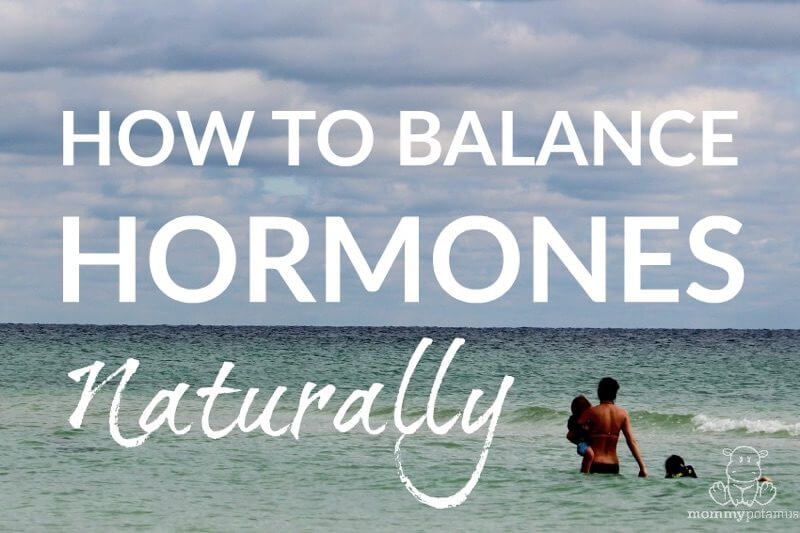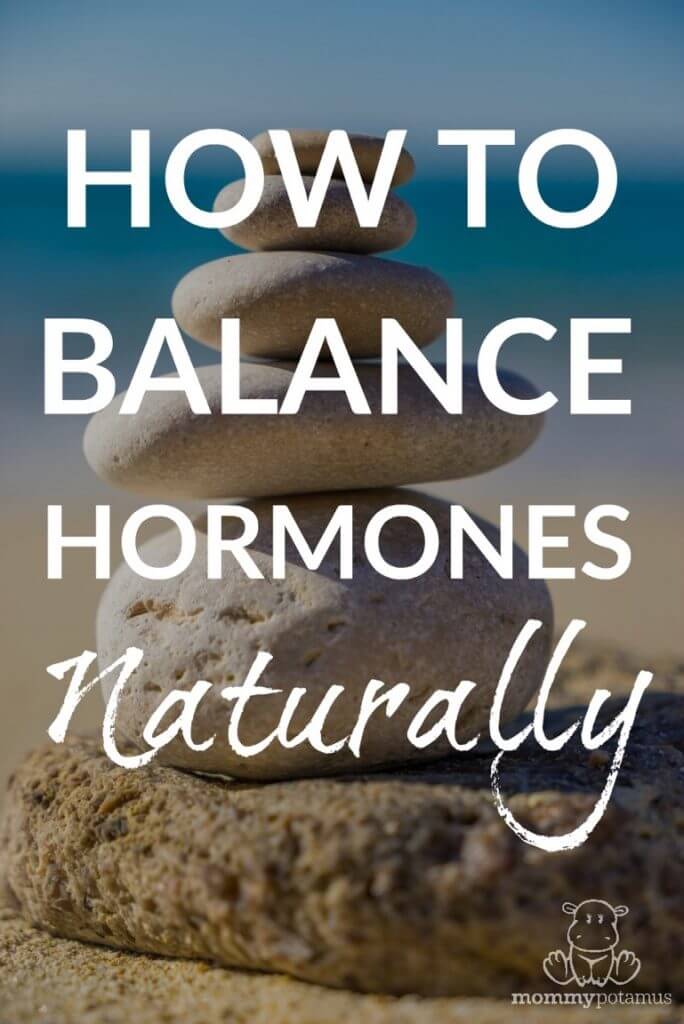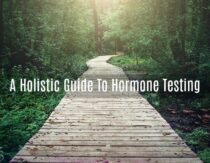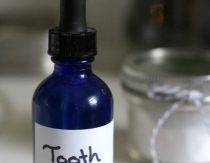
“WELL, THAT EXPLAINS A LOT.” <– If that was your reaction after reading this post on the symptoms of hormone imbalance, you’re in the right place.
Although hormone testing can be incredibly helpful – and it is certainly important to talk with your practitioner about if you suspect something is off – there are some things that tend to benefit everyone when it comes to balancing hormones naturally.
Start with lifestyle redesign: optimize nutrition, exercise, and mental retraining. No need for testing . . . before beginning these strategies,” writes Harvard-educated Dr. Sara Gottfried in her book, The Hormone Cure.
In this post we’ll be discussing many of the strategies she recommends, but for a deeper dive you can pick up her book here.
One quick note: Please keep in mind that this article is for informational purposes only and is based on the opinions of the authors. It is not intended to be a substitute for professional medical advice, diagnosis, or treatment – a full disclaimer can be found here. Okay, let’s jump in!
Are women more vulnerable to hormonal imbalance?
Yes. According to Dr. Sara Gottfried, “For one thing, women have babies. Pregnancy amplifies the demands on the endocrine glands, which release hormones such as estrogen, testosterone, cortisol, thyroid, leptin, growth hormone and insulin.”
However she adds that women who have not had babies also tend to be more vulnerable to imbalance than men because “Women are exquisitely sensitive to hormonal changes. And they’re susceptible to the stress of juggling multiple roles.” (The Hormone Cure)

How to Balance Hormones Naturally
As mentioned earlier, although it’s a good idea to work with a practitioner, below are some lifestyle changes tend to benefit everyone. Please don’t try to do everything all at once! This post includes many options for accomplishing a goal – reducing stress, for example. Choose what works for you and ignore the rest.

#1: Reboot your stress response
It’s not everyday that a mother fights a polar bear to protect her seven year-old son, or two sisters lift a 3,000 pound tractor off their dad. However, both are examples of how the stress response primes us to act quickly in response to physical danger. It’s an internal alarm that helps us respond to situations, sometimes in extraordinary ways.
Unfortunately, our bodies aren’t always good at differentiating major threats from minor stresses and annoyances. With modern life the way it is, our alarms can easily get stuck in “on” mode. When that happens, our bodies may “steal” the building blocks we need to make progesterone, estrogen, progesterone, testosterone, DHEA to make extra cortisol instead.
Here are eight ways to manually reset the alarm.

#2: Reduce exposure to hormone disruptors
There is no end to the tricks that endocrine disruptors can play on our bodies: increasing production of certain hormones; decreasing production of others; imitating hormones; turning one hormone into another; interfering with hormone signaling; telling cells to die prematurely; competing with essential nutrients; binding to essential hormones; accumulating in organs that produce hormones.” – Environmental Working Group
Hormone disrupting chemicals are everywhere, from the BPA on store receipts to the flame retardants in kids pajamas and furniture. Oh, and then there’s the whole beauty aisle, plus plastic food containers, non-stick cookware and the pesticides used on fruits and vegetables.
Fortunately, through a few simple lifestyle changes we can dramatically reduce our exposure:
- Avoid BPA-lined cans and opt for glass water bottles and glass food storage containers rather than plastic ones. Also, don’t be fooled. Many “BPA-free” products actually contain a form of bisphenol that is thought to be even worse.
- Read the labels of your skincare, makeup, and body care products. Be sure to avoid products with parabens, pthalates, petroleum, glycol ethers and perfume/fragrance (companies often hide chemicals they don’t want to disclose under the “fragrance” section because the formulas are considered proprietary and don’t have to be disclosed.) Or, better yet, rather than simply trying to avoid chemicals, opt for personal care products whose ingredients are easy to recognize: For example, tallow balm is uniquely compatible with our skin’s biology, this tooth powder leaves your mouth feeling incredibly clean, and this deodorant only contains ingredients you can pronounce. This shopping list is currently in the process of being updated – you’ll find a lot more personal care product recommendations soon.
- Make your own products at home, and save money too!

#3: Nourish yourself with hormone-friendly nutrients
It’s only when we have enough building blocks for our hormones that our bodies can make adequate levels of them. A hormone-friendly diet should comprise of a (mostly) nutrient-dense, whole foods diet, such as:
- Vegetables and fruits
- Meat and bone broth – Organ meats are especially helpful. If you’re new to preparing them, check out this chili and this bacon and liver pate.
- Wholesome fats such as butter, ghee, lard, tallow and coconut oil
- Herbs and spices
- Properly-prepared legumes and grains, if tolerated (Grains are somewhat controversial. Some people tolerate them well while others don’t. White rice is often embraced by the paleo community despite it’s status as a grain, and many people do well with beans prepared using this traditional method. Everybody’s different!)
- Fiber to help the body clear excess hormones
- Magnesium rich foods – Magnesium helps to balance cortisol, supports the thyroid, and aids in the production of progesterone, estrogen, and testosterone. (source) Magnesium is also well absorbed through the skin, which is why this bath salts recipe can help improve levels.
Go for organic and pastured products as often as your budget allows. Also, consider cutting out gluten if you suspect you might be sensitive to it. According to Dr. Sara Gottfried, “Typically, problems with gluten cause diarrhea, abdominal pain and bloating. In women, however, sometimes the only tipoff is bone loss, irregular cycles, or difficulty getting pregnant. Gluten intolerance has been linked to altered estrogen levels and consequences such as amenorrhea (no periods for several months), infertility, and diminished ovarian reserve.” (The Hormone Cure)
Unfortunately, it is possible to experience nutrient deficiencies even when you are eating an optimal diet if your digestive system is compromised and absorption is low. In addition, stress, toxicity, inflammation, and genetics (such as an MTHFR mutation) may increase your demand for certain nutrients, such as B-vitamins and folate. We can often detect nutrient deficiencies via lab tests, such as a urine organic acids test for some B vitamins. In this case, it will be wise to supplement and to support the digestive system accordingly.
#4: Stabilize blood sugar
While sugar may have a bad rep, every cell in your body runs on glucose, the sugar that we have in our blood.
Maintaining a steady level of glucose in the blood is so important to our survival that our bodies have 4 hormones that can increase blood sugar, but only one that decreases blood sugar (i.e. insulin). Two of the hormones that can increase blood sugar are cortisol and adrenaline, which are both adrenal hormones.
Low blood sugar can put your body into a fight or flight response. It increases cortisol and adrenaline and is a major source of stress. Low blood sugar can cause hormone imbalances by increasing the demand for cortisol and adrenaline at the expense of other hormones.
Conversely, high blood sugar may not only lead to diabetes, but in women, it can also lead to Polycystic Ovarian Syndrome (PCOS) which results in high testosterone, ovarian cysts, and infertility.
Here are ten ways to balance blood sugar naturally.
#5: Look into leptin
Although not as famous as insulin or testosterone, leptin is really the CEO of all your hormones. Your fat cells secrete leptin, so the more body fat you have, the more leptin you have. Leptin signals to your body that you’ve got adequate energy stores (aka fat) and it’s time to reduce food cravings.
On the other hand, if your body fat level is too low your leptin levels will be low. This signals to the body that you need to eat more, and it also shut downs production of your sex hormones, adrenal hormones, and thyroid hormones. It figures you don’t need them until you get your fat stores back up, because pregnancy is a better idea when you have access to adequate nutrition. That’s why a very low body fat percentage can cause hypothalamic amenorrhea, a condition where women stop menstruating.
So, what does it mean when you have adequate fat stores AND food cravings? Shouldn’t the leptin your fat cells are releasing lower appetite? Yes, they should. However, hormones are like keys that fit into very specific locks (cells) in the body. If the locks are broken, it doesn’t matter whether you have 1 key or 1,000,000. When the locks – or cells – are unable to receive the leptin, you may have symptoms of low levels leptin even when levels are high. This is called leptin resistance.
Leptin resistance can be caused by:
- Sleep deprivation or misaligned body clock
- Inflammation
- Chronic or yoyo-dieting, or simply under-eating
- Morbid obesity
- Insulin resistance
- High cortisol from a mentally or physically stressful lifestyle
- Being on a very low carb or ketogenic diet for a long time without long term re-feeds (source 1, source 2, source 3, source 4)
So how do we support a healthy response to leptin? To balance hormones, it’s important to re-align your body clock and strive for deep, restorative sleep and nourish the body well (see #3 above).
If are asleep for more than 8 hours every night, but feel like you can never get enough sleep, it may be helpful to ask your doctor about testing for nutritional deficiencies and/or getting a referral for a sleep medicine specialist. Also, if you are dealing with morbid obesity and insulin resistance, you should speak to your doctor before making changes to your diet and lifestyle plans.
#6: Support mitochondrial function
Your mitochondria are the small energy powerhouses in your cells. They are responsible for many things, but some of the most important functions are the production of your steroid hormones and energy production.
Low mitochondrial function is usually experienced as feeling “low-energy.” Most of us aren’t born with genetic problems that affect the mitochondria, but many things our environment and lifestyle can negatively impact the mitochondria. These include:
- Medications, especially statin drugs, because they lower CoQ10 (source)
- Pesticides (source 1, source 2)
- Oxidative stress caused by inflammation (source)
- Environmental toxins (source)
- Nutritional deficiencies
Fortunately, there are many ways to optimize mitochondrial function:
- Eat a nutrient-dense diet, with more mitochondria. Organ meats, especially heart, brain, and liver, typically contain a lot more mitochondria than other meats.
- Supplements including B vitamins, antioxidants, magnesium and CoQ10
- Light to moderate exercise. (Note from Heather: Walking and short, 10-15 minutes kettlebell workouts are two of my favorite options.)
- Near-infrared light – “The effect on cells of near-infrared light, which has a wavelength of 670 nanometres, was first reported 40 years ago. The light causes mitochondria, the cell’s powerhouses, to produce more ATP, a compound that provides the cell’s energy.” (source) Some infrared saunas – like this one – incorporate near-infrared light.
#7: Support Detoxification
Have you ever seen the I Love Lucy chocolate factory episode? It’s pretty much the perfect metaphor for what our detoxification systems face these days.
Not only do our bodies need to break down excess hormones that we produce, they also need to get rid of synthetic “hormones” we encounter in the environment, plus other compounds that affect hormone function.
Detoxification practices such as sweat lodges were practiced by traditional cultures long before these new challenges were introduced, and they’re even more important today. Here are some ways to do that:
- Herbs such as yellow dock root and burdock root support the liver’s ability to detox (we’ll be talking more about these herbs and others you may find helpful soon)
- Dry brushing supports the lymphatic system
- For individuals with the MTHFR mutation, working on methylation can optimize the body’s detox pathways
- Infrared sauna therapy induces sweating. Sweat contains both hydrophyllic (water soluble) and lipophilic (fat soluble) components makes it an elimination pathway for a variety of toxins, including hormone disrupting chemicals such as BPA, PCB’s, and phthalates, plus heavy metals like arsenic, cadmium, lead and mercury.
How to Balance Your Hormones in a Nutshell
1) Live a clean, non-toxic lifestyle
2) Manage stress using these eight strategies
3) Get consistently good quality sleep
5) Exercise, but don’t over-exercise
6) Eat a nutrient-dense diet, and supplement as necessary. If needed, work on balancing blood sugar.
7) Support detoxification
Now, it’s possible to take this approach and still deal with symptoms hormone imbalance that just won’t go away. Sometimes hormones take time to heal. Other times, we need a health detective with a magnifying glass and some lab tests to really see what’s going on.
What’s your experience been with hormone balancing?
About the authors: This article was coauthored by Heather Dessinger Dr. Natcha Maithai (PhD). Dr. Maithai is a Registered Holistic Nutritionist and Functional Diagnostic Nutrition Practitioner with a PhD in molecular genetics. After becoming frustrated with hormonal problems that went undiagnosed despite her best efforts, Dr. Maithai applied tools she learned as a cancer researcher to dive into available scientific literature and find a holistic solution. You can find her health insights, biohacking tips, and information about working with her on her website, Natcha Maithai.
This article was medically reviewed by Dr. Anna Cabeca, a gynecologist and obstetrician and a menopause and sexual health expert. As always, this is not personal medical advice and we recommend that you talk with your doctor.





What do you think of T-Tapp workouts? I see it mentioned in your link for balancing blood sugar.
I used to do t-tapp but recently learned that tucking your tailbone in is a sure fire way to create prolapse. After having a baby I would never do those exercises again.
There is a lot of good information in this post. I think sleep deprivation can wreak havoc on our bodies. I try to get 8 hours of sleep a night.
Whole grains is another suggestion to help decrease insulin resistance and increase our intake of fiber and nutrients.
I am not a fan of hormone testing whether through blood or saliva. Our hormone levels fluctuate throughout the day as well as day to day. A test can tell if you if you are in menopause but it is unlikely to provide any additional information.
Thank you for bringing awareness to this very important topic.
Unless the hormone levels are extremely far outside the normal range or completely non-existent. Both happened to me at age 26, but I had the devil of a time getting anyone to test anything except my thyroid which was normal because they all said that hormone tests wouldn’t show anything.
So, while it is a problem when people take the results of testing to mean more than they should, avoiding the tests altogether because of this can cause a bigger problem.
PCOS is a genetic condition that you are born with. Lifestyle choices and alternative therapies can help manage symptoms but having uncontrolled or high blood sugar cannot cause a woman to develop PCOS.
Hi, I have a chance for II diabetes. I learning how can I push it lower with other natural foods, oils, with apple cider vinegar. There is essential oil too, what helps with PCOS, the digest zen from doTERRA, or Plant therapy. Or a good reflexology might help.
Heather, what would be your advice for an overwhelmed momma who has been trying to help her teen daughter with what seems to be major hormone imbalances? I’m so tired of spending money and not getting results. We’ve also tried many things at home with little improvement and I just feel like we need to know exactly what we’re dealing with. I want to find someone who is going to know the right tests to run and help her on the path to healing. Thanks for any insights.
Hi, what u tried with her? Maca powder ( hormone balance )? Essential oils? Reflexology? Acupuncturist?
Evening prim rose oil!
Thank you, Heather for this timely post! I have recently been experiencing some pain which I’m certain is due to an hormonal imbalance! I’m post-menopausal and was placed on a bio-identical progesterone (oral), however every time I was on it my breasts would become very swollen and tender/painful. I’m trying now to do what I can to balance my hormones naturally as I transition into menopause. What are your thoughts on Red Clover tea? I’ve been having quite a bit of spiking in my estrogen levels for some reason (I eat a paleo diet and don’t use plastics and walk outdoors every day, weather allowing) and I’m having night sweats and restless sleep. I’m currently taking a DIM supplement to help with the estrogen intake, as well as drinking flax seeds. I’m glad you pointed out the MTHFR, which I have! I’m taking a multi-vitamin that contains folate as 5-MTHF (5-methyltetrahydrofolate), and B12 as methylcobalaminsure. I work with a dr for dosage. What else I can do? Traditional doctors just want to prescribe hormones. 🙁
I looked at the sources listed under Look Into Leptin but didn’t see anything that backed up the comment about long term lo-carb or ketonegic diets. Could you please point me to that? I am currently keto and am trying to learn as much as I can. Thank you for the very informative hormone series that you are doing. 🙂
I find it very interesting that meat, specifically bacon, is mentioned on here — I would be very curious to hear the reasoning behind that 🙂
Hello,
This is a great article but i am still little confused,
my best friend is 30 weeks pregnant, she told me that she read an article about oxytocin, prolactin, and relaxin hormones and that these hormones are responsible for relaxing the muscles necessary for the delivery of a baby [relaxin hormone] and production of milk [prolactin hormone],she is asked for a suggestion that how to balance these these hormone levels. Trust me i dont anything about this hormone balancing.she taking too much of stress that i cant even ignore her .if any suggestions let me know in comment box. PLEASE..
My problem is higher than acceptable fasting blood sugar numbers in the 7’s. I am convinced it is because of my sleep pattern. Since menopause 16 years ago I have suffered from 2 hour sleep stints. I wake every 2 hours, maybe go to the bathroom, maybe have a hot flush and then go straight back to sleep for another 2 hours. Sometimes it is 90mins. I think I wake at the end of a sleep cycle. I am not tired during the day so I must be getting enough sleep. I have kept to a low carb/low GI diet with exercise for the last 15 years because of genetic Type 2 diabetes . My last Hba1c was 42 but that was 6 months ago. I will get another one done next week if I can but I know its now going to be metformin time which is what I have been trying to avoid. The higher fasting numbers started a couple of months ago when I got a shoulder impingement which has caused shoulder pain at night which was also waking me. Now it is not waking me but I find it difficult to find a place to place my arm so it doesn’t ache when I go back to sleep after the 2 hour sleep stints.
Any suggestions will be greatly appreciated.